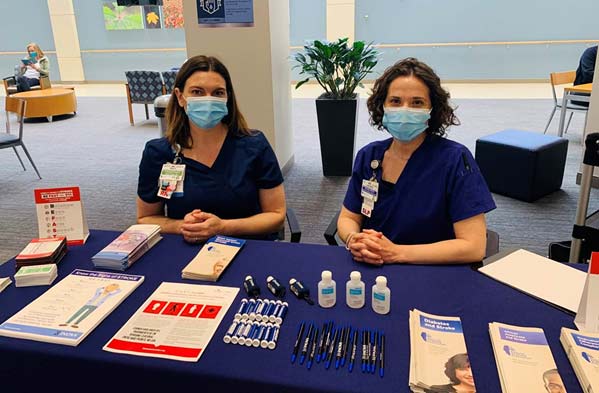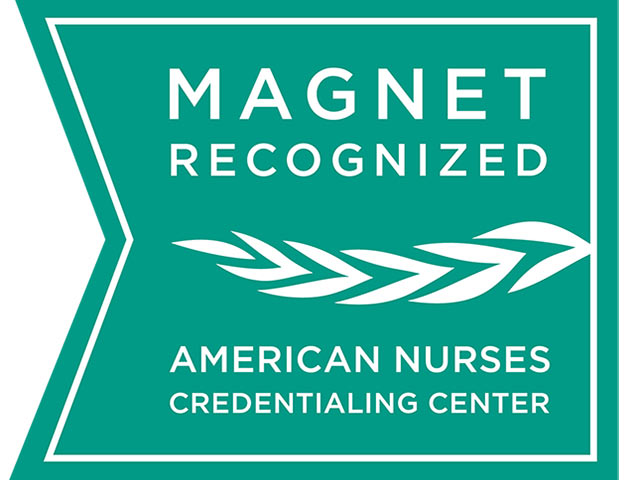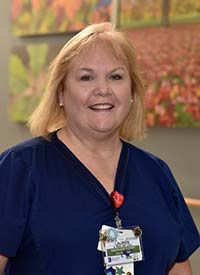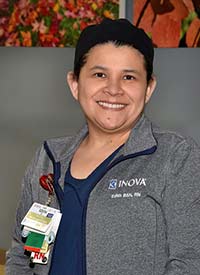 The IMVH nursing team works in partnership with colleagues across the organization to advocate for high-quality patient outcomes. Nurses at all levels participate in, and lead, interprofessional teams focused on improving patient care and safety. Nurses lead the interprofessional Stroke Committee, MSET Team and Sepsis Team.
The IMVH nursing team works in partnership with colleagues across the organization to advocate for high-quality patient outcomes. Nurses at all levels participate in, and lead, interprofessional teams focused on improving patient care and safety. Nurses lead the interprofessional Stroke Committee, MSET Team and Sepsis Team.
In 2020, IMVH continued to be a leader both regionally and nationally in providing world-class sepsis care. For the fourth year in a row, our hospital had the highest compliance among Inova hospitals with the SEP-1 core measure. At the end of 2020, CMS.gov reported that we had achieved 90% on SEP-1, well above the Virginia average of 54% and national average of 60%. Despite the challenges of 2020, IMVH maintained better-than-expected sepsis mortality rates, even when compared to similarly sized Magnet hospitals across the nation. In 2020, our Emergency Department team reduced the time it takes for severe sepsis and septic shock patients to receive antibiotics by 15%. Nurses, working alongside providers and team members from multiple disciplines, have led the way with these lifesaving initiatives. IMVH officially received its two-year Joint Commission recertification as a Primary Stroke Center and was redesignated as a Center of Excellence for hip/knee surgery.
Nurses are acutely aware of their unit-based quality data and review strategies geared toward improvement at their council meetings. We consistently outperform benchmarks on nursing-sensitive indicators including falls with injury, HAPIs, CAUTIs, and CLABSIs, and have active plans in place to sustain our excellent outcomes. This performance is indicative of front-line nurses’ commitment to evidence-based practice and exemplary professional practice.
In the 2020 National Database of Nursing Quality Indicators RN satisfaction survey, IMVH nurses exceeded benchmark in the Magnet domains of adequate staffing, manager/leader, foundations for quality care, participation in hospital affairs, autonomy, professional development opportunities and interprofessional relationships.
 Inova Mount Vernon Hospital is proud to receive our first Magnet® designation. Our journey to Magnet was well underway when the COVID-19 pandemic occurred. Through all the challenges, our nurses’ commitment to our mission, vision and values remain steadfast. I am incredibly proud of and grateful for our talented team here. To achieve this distinction during some of the most complicated and difficult years of our nation’s history truly exemplifies an extraordinary level of dedication, resilience and support for one another.
Inova Mount Vernon Hospital is proud to receive our first Magnet® designation. Our journey to Magnet was well underway when the COVID-19 pandemic occurred. Through all the challenges, our nurses’ commitment to our mission, vision and values remain steadfast. I am incredibly proud of and grateful for our talented team here. To achieve this distinction during some of the most complicated and difficult years of our nation’s history truly exemplifies an extraordinary level of dedication, resilience and support for one another. Inova Mount Vernon Hospital is proud to announce it has been designated as a Magnet hospital by the American Nurses Credentialing Center (ANCC).
Inova Mount Vernon Hospital is proud to announce it has been designated as a Magnet hospital by the American Nurses Credentialing Center (ANCC). Magnet means the highest of standards. When you set the bar high, people rise to expectations. It means a solid, inherent commitment to excellence for every patient, their family members and every visitor to Inova. I take pride in the care of my patients and the entire patient experience. This means treating patients and their support system with dignity and respect, while providing physical and emotional support, education, access to additional services and a caring and compassionate heart. Magnet for me is the standard of excellence that we provide always.
Magnet means the highest of standards. When you set the bar high, people rise to expectations. It means a solid, inherent commitment to excellence for every patient, their family members and every visitor to Inova. I take pride in the care of my patients and the entire patient experience. This means treating patients and their support system with dignity and respect, while providing physical and emotional support, education, access to additional services and a caring and compassionate heart. Magnet for me is the standard of excellence that we provide always. A nurse who works in a Magnet hospital is very proud to be part of that team, because it means that the organization takes care of their employees and their employees take good care of patients. It's like a change reaction. Positive energy can be contagious. The nurses and interprofessional team are knowledgeable, supportive and current with evidence-based practice, which ensures excellent patient care and a supportive, dynamic nursing practice environment.
A nurse who works in a Magnet hospital is very proud to be part of that team, because it means that the organization takes care of their employees and their employees take good care of patients. It's like a change reaction. Positive energy can be contagious. The nurses and interprofessional team are knowledgeable, supportive and current with evidence-based practice, which ensures excellent patient care and a supportive, dynamic nursing practice environment. I am a part of a great work environment, and I have the support of my nursing leaders to empower my patients and the community I serve. Being Magnet would mean that everyone would know all that we do is done with compassion, competence and is grounded in evidence-based practice. As a direct care nurse, Magnet means I am supported in my professional development through education, peer feedback, certification resources and a clinical ladder for advancement.
I am a part of a great work environment, and I have the support of my nursing leaders to empower my patients and the community I serve. Being Magnet would mean that everyone would know all that we do is done with compassion, competence and is grounded in evidence-based practice. As a direct care nurse, Magnet means I am supported in my professional development through education, peer feedback, certification resources and a clinical ladder for advancement. To me, being a Magnet nurse means providing excellence in nursing care and quality care, using evidence-based practice to achieve results at bedside. As a Magnet nurse, I am empowered to collaborate with other disciplines and teams to bring the best to my patients. I am part of shared governance for my department and my opinion is treasured and incorporated in making decisions or changes. My organization offers me the opportunity to grow as a nurse through advancement, certification, research and leadership opportunities. I’m rewarded for my achievements. I feel love, care and support from my organization. I’m able to channel the same to my patients at the bedside, to give them excellent care for optimum patient satisfaction.
To me, being a Magnet nurse means providing excellence in nursing care and quality care, using evidence-based practice to achieve results at bedside. As a Magnet nurse, I am empowered to collaborate with other disciplines and teams to bring the best to my patients. I am part of shared governance for my department and my opinion is treasured and incorporated in making decisions or changes. My organization offers me the opportunity to grow as a nurse through advancement, certification, research and leadership opportunities. I’m rewarded for my achievements. I feel love, care and support from my organization. I’m able to channel the same to my patients at the bedside, to give them excellent care for optimum patient satisfaction. IMVH embraces a culture of shared governance and our Magnet® journey has ignited a spark in clinical nurses leading the way for change. Nurses at all levels are included in the work of shared governance and unit practice councils. In 2021, Sara G. Mulhern, BSN, RN4, CMSRN, became chair of our Care Site Council and co-chair of the Inova Health System Nursing Shared Governance Council.
IMVH embraces a culture of shared governance and our Magnet® journey has ignited a spark in clinical nurses leading the way for change. Nurses at all levels are included in the work of shared governance and unit practice councils. In 2021, Sara G. Mulhern, BSN, RN4, CMSRN, became chair of our Care Site Council and co-chair of the Inova Health System Nursing Shared Governance Council. The IMVH nursing team works in partnership with colleagues across the organization to advocate for high-quality patient outcomes. Nurses at all levels participate in, and lead, interprofessional teams focused on improving patient care and safety. Nurses lead the interprofessional Stroke Committee, MSET Team and Sepsis Team.
The IMVH nursing team works in partnership with colleagues across the organization to advocate for high-quality patient outcomes. Nurses at all levels participate in, and lead, interprofessional teams focused on improving patient care and safety. Nurses lead the interprofessional Stroke Committee, MSET Team and Sepsis Team.